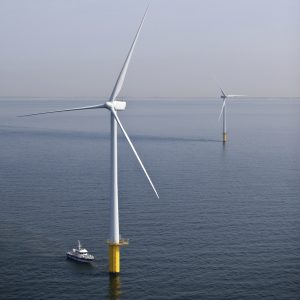Wind Turbines Unlikely to Chase Tourists Away, Research Shows
 Two wind power turbines proposed for the waters off Monhegan Island would not scare away the tourists who flock to the island, according to a summer-long study by researchers at UMaine’s Senator George J. Mitchell Center for Sustainability Solutions.
Two wind power turbines proposed for the waters off Monhegan Island would not scare away the tourists who flock to the island, according to a summer-long study by researchers at UMaine’s Senator George J. Mitchell Center for Sustainability Solutions.
Over 90 percent of the 180 tourists surveyed said they would continue to visit Monhegan whether the turbines are installed or not. When asked about wind turbine placement in general, 80 percent of participants preferred that turbines be away from special scenic places, however, 70 percent said they expected the proposed Monhegan turbines to have no impact on their overall visitor experience. Only one percent said the placement of the turbines would cause them to stop visiting Monhegan.
The survey was aimed at learning how people react to scientific information in decision making. To accomplish this, survey participants saw one of two survey versions. One version used static pictures of the proposed turbines while the other showed a virtual reality rendering of the turbine and surrounding environs. These visuals were developed by UMaine’s Virtual Environment and Multimodal Interaction (VEMI) Laboratory under the direction of Nicholas A. Giudice, Associate Professor in the School of Computing and Information Science and Rick Corey, Director of Operations at VEMI. Survey team leaders Mario Teisl and Caroline Noblet, Professor and Assistant Professor in the School of Economics, note that the analysis of participant reactions is ongoing.
“We are excited to see if more advanced virtual reality scenarios resulted in people thinking differently about the proposal”, Noblet said.
The average age of the participants surveyed was 50 with a gender split down the middle. They had, on average, an annual household income of $100,000. The pool contained both day trippers and overnight visitors and the team intends to prepare analysis on both types of visitors.
The project was funded by the Mitchell Center’s Emerging Opportunities – Foundations for Future Research grant program. Focused on broadening the scope of sustainability science research, these projects offer scientists a chance to engage new stakeholders in new places in new ways.
A venture of University of Maine called Maine Aqua Ventus I, the proposed wind energy project is a two-turbine, 12 megawatt floating deep water offshore wind energy pilot project. Aqua Ventus is a consortium that includes Emera, Cianbro Corp. and Maine Prime Technologies LLC, a spinoff company representing the University of Maine.
The research is supported by National Science Foundation award EPS-0904155 to Maine EPSCoR at the University of Maine.
VIDEO: Researcher Nicholas Guidice describes the use of virtual reality technology in this study: Using virtual reality as a tool for improving wind energy visualization
